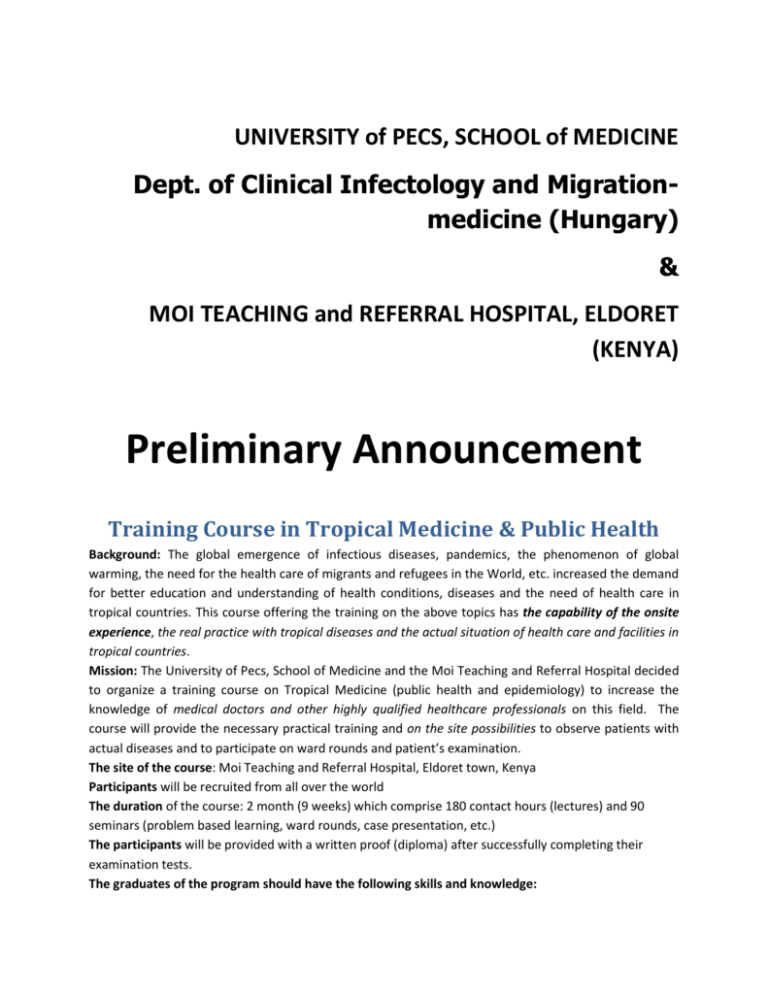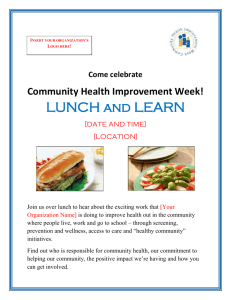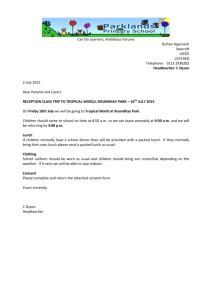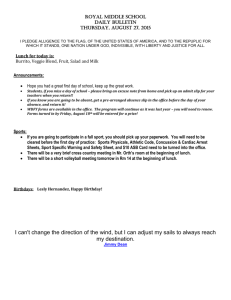Training Course in Tropical Medicine & Public Health
advertisement

UNIVERSITY of PECS, SCHOOL of MEDICINE Dept. of Clinical Infectology and Migrationmedicine (Hungary) & MOI TEACHING and REFERRAL HOSPITAL, ELDORET (KENYA) Preliminary Announcement Training Course in Tropical Medicine & Public Health Background: The global emergence of infectious diseases, pandemics, the phenomenon of global warming, the need for the health care of migrants and refugees in the World, etc. increased the demand for better education and understanding of health conditions, diseases and the need of health care in tropical countries. This course offering the training on the above topics has the capability of the onsite experience, the real practice with tropical diseases and the actual situation of health care and facilities in tropical countries. Mission: The University of Pecs, School of Medicine and the Moi Teaching and Referral Hospital decided to organize a training course on Tropical Medicine (public health and epidemiology) to increase the knowledge of medical doctors and other highly qualified healthcare professionals on this field. The course will provide the necessary practical training and on the site possibilities to observe patients with actual diseases and to participate on ward rounds and patient’s examination. The site of the course: Moi Teaching and Referral Hospital, Eldoret town, Kenya Participants will be recruited from all over the world The duration of the course: 2 month (9 weeks) which comprise 180 contact hours (lectures) and 90 seminars (problem based learning, ward rounds, case presentation, etc.) The participants will be provided with a written proof (diploma) after successfully completing their examination tests. The graduates of the program should have the following skills and knowledge: 1. The skill to recognize and treat tropical diseases 2. The knowledge of the scope and the appearance of the diseases in tropical countries 3. Appropriate knowledge on tropical epidemiology and public health related to the topics listed in the proposed curriculum 4. Appropriate skill to work in a health care system with limited resources 5. The skill how to implement public health measures to tackle epidemics 6. Appropriate knowledge to meet the demand of refugee health care 7. The skill to actively participate in organizing and operating health care facilities in refugee camps 8. The faculty (teaching team) for the training course is composed of doctors from the Moi Teaching and Referral Hospital (MTRH), Eldoret, Kenya and the from the School of Medicine, University of Pecs, Hungary as follows: Introduction Psychiatric disorders Gastrointestinal diseases In tropical countries Respiratory diseases in Tropical countries Neurologic diseases Opthalmological disorders : Prof. H.N.K. Arap Mengech, MD, PhD : Dr. Jack Nyabundi, Medical Specialist Physician : Sexually Transmitted Disorders HIV / AIDS : Infectious disease of Childhood Disorders of Urogenital Tracts Tropical Public Health Parasitological, protozoan Diseases, leprosy Zoonotic infections Refugee issues, nutrition : Dr. Lamerk Diero, Medical Specialist Physician MSc Medical Informatics Dr. Barasa, Medical Specialist, Physician Dr. Jorry Odede, Medical Specialist, Ophthalmologist Dr. Grace Wamburu, Medical Specialist, Dermatologist Dr. Sylvester Kimaiyo, Medical Specialist, Physician Dr. John Chumba, Medical Specialist, Paediatrician : Dr. Mugalo, Medical Specialist Urologist : : Dr. Diana Menya, Epidemiologist. Prof. Dr. Gabor Ternak MD, PhD : : Dr. Zoltan Peterfi, Md, PhD Dr. Istvan Szilard, MD, PhD, Prof. tit. : : : Leader of the training program from MRTH: Prof. Dr. H. N. K. Arap Mengech, MD, PhD Leader of the training from the University of Pecs: Prof. Dr. Gabor Ternak, MD, PhD The tuition fee for the 9 weeks: 5000 USD The minimum number of participants: 15 Maximum number of participants: 30 Scheduled beginning of the training: 5-th July, 2010 Further information: Prof. Dr. Gabor Ternak, e-mail: ternak@t-online.hu The accreditation procedure is in progress, expected completion of the proceed is mid-March, 2010 Timetable 10h-10h45 11h-11h45 12-12h45 12h4514h 14h-16h Monday Introduction Epidemiology of Tropical diseases Epidemiology of Tropical diseases Epidemiology of Tropical diseases Lunch Ward rounds, patient's presentation Tuesday The role of traditional healers in tropical countries General approach to the patients, ethical issues, working with limited resources Special considerations on physical examination Special considerations on physical examination Lunch Ward rounds, patient's presentation Wednesday Gastrointestinal diseases in tropical countries: overview Bacterial infections: cholera Bacterial infections: salmonellosis gastroenterit. Enteric fever (typhoid, paratyphoid A, B) Lunch Ward rounds, patient's presentation Thursday Blood in the stool: differential diagnosis Shigellosis Campylobacter, E. coli, yersiniosis Entamoeba histolytica infection Lunch Ward rounds, patient's presentation Friday Entamoeba histolytica 1. Entamoeba histolytica 2. (extra intestinal manifestations) Intestinal protozoan infections Chronic diarrheal diseases in the tropics Lunch Ward rounds, patient's presentation Monday Intestinal parasitic infections: Round worms Ascariasis, ancylostomiasis, trichinellosis, others Schistosomiasis: Epidemiology, life circle Schistosomiasis: Clinical picture, complication and treatment Lunch Parasitological diagnosis, laboratory demonstration Tuesday Cestodes: Tapeworms Hydatid diseases, cysticercosis Fluke infections: epidemiology, life cycle Liver flukes, lung flukes Lunch Parasitological diagnosis, laboratory demonstration Wednesday Respiratory diseases in the tropics Pneumonia, atypical pneumonias Pulmonary tuberculois: bacteria, epidemiology, surveillance Clinical manifestation Lunch Case presentations, problem based learning, small group consultations Thursday Extrapulmon. tuberculosis, treatment (DOT) Asthma and other pulmonary syndromes Cardiovascular diseases in the tropics: general considerations Primary cardiovascular diseases: endomyocardial fibrosis, peripartum cardiac failure Lunch Case presentations, problem based learning, small group consultations Friday Neurologiocal diseases: general considerations, epidemiology Meningitis: etiology epidemiology Viral meningitis, bacterial meningitis, other etiologies Encephalitis, neuritis, prion diseases: Rabies and rabies-like diseases, Japanese B encephalitis, poliomyelitis, kuru Lunch Case presentations, problem based learning, small group consultations Diseases of the hepatobiliary tracts: general considerations Noninfectious diseases: Bantu siderosis, venoocclusive disease, indian childhood cirrhosis, toxic hepatic injuries (alcohol, aflatoxin) Primary viral hepatitis in the tropics Cnronic hepatitis: epidemiology, treatment possibilities Lunch Case presentations, problem based learning, small group consultations First week 9h-9h45 Saturday Sunday Second week Saturday Sunday Third week Monday Tuesday Hematologic diseases in the tropics: general considerations Anaemia in the tropics Haemoglobin disorders. Sicle cell disease Thalassemias, nutritional deficiences Lunch Case presentations, problem based learning, small group consultations Wednesday Ophtalmological disorders: general consideration, epidemiology Painful red eye: differential diagnosis, inclusion conjunctivitis Blindness in the tropics: differential diagnosis, trachoma, river blindness Chronic ophtalmic disorders Lunch Case presentations, problem based learning, small group consultations Thursday Sexually transmitted diseases: epidemiology, general considerations Syphilis (Treponema pallidum infections) Non-venereal treponematosis Differential diagnosis of vaginal discharge & male urethritis Lunch Case presentations, problem based learning, small group consultations Friday Gonorrhea: epidemiology, clinical manifestation, treatment Donovanosis, lymphogranuloma venereum, Chancroid HIV/AIDS: Epidemiology HIV/AIDS: The virus, the mode of transmissions Lunch Case presentations, problem based learning, small group consultations Monday HIV/AIDS: clinical manifestation 1. HIV/AIDS: clinical manifestation 2. HIV/AIDS: clinical manifestation 3. HIV/AIDS: clinical manifestation 4. Lunch Case presentations, problem based learning, small group consultations Tuesday Opportunistic infections in HIV/AIDS 1. Opportunistic infections in HIV/AIDS 2. Opportunistic infections in HIV/AIDS 3. Malignancies in HIV/AIDS infections Lunch Case presentations, problem based learning, small group consultations Wednesday Treatment and prevention of HIV/AIDS 1. Treatment and prevention of HIV/AIDS 2. Treatment and prevention of HIV/AIDS 3. Public health, education, VCT (voluntary counseling and testing) Lunch Case presentations, problem based learning, small group consultations Thursday Malignant diseases in the tropics 1. Malignant diseases in the tropics 2. Metabolic disorders: diabetes Endocrinology in the tropics Lunch Case presentations, problem based learning, small group consultations Friday Vitamin deficiencies 1. Vitamin deficiencies 2. Protein-energy malnutrition: general considerations, marasmus Kwashiorkor Lunch Case presentations, problem based learning, small group consultations Monday Nutritional councelling General approach to child health care Infectious diseases of childhood: diphtheria Infectious diseases of childhood: measles Lunch Case presentations, problem based learning, small group consultations Tuesday Infectious diseases of childhood: scarlat fever, rubella, pertussis Infectious diseases of childhood: varicella, monkey pox, pox virus diseases Infectious diseases of childhood: parotitis epidemica, infections of the oral cavity Prevention and controll of childhood epidemics Lunch Case presentations, problem based learning, small group consultations Wednesday Infections of the skin and skin structures: classification, general considerations Pyoderma: impetigo, staphyloderma, cellultis, ectoparasites Anthrax epidemiology, clinical pictures, treatment Tropical ulcers, pyomyositis, gasgangrene Lunch Case presentations, problem based learning, small group consultations Saturday Sunday Fourth week Saturday Sunday Fifth week Thursday Toxin-mediated diseases: food poisonings Toxin-mediated diseases: tetanus, botulism Venomous stings and bites 1. Venomous stings and bites 2. Lunch Case presentations, problem based learning, small group consultations Friday Disorders of the urogenital tracts: general considerations Nephritis syndromes in the tropics Nephrosis syndrome in the tropics Uroinfections Lunch Case presentations, problem based learning, small group consultations Monday Dengue and dengue haemorrhagic fever West-Nile fever, Chicungunya fever O'nyong-nyong fever, Rift Valley fever Ross-River fever (Epidemic polyarthritis) Lunch Case presentations, problem based learning, small group consultations Tuesday Viral equine encephalitis Other febrile viral infections in the tropics (CMV, EBV, human papilloma virus) 1. Other febrile viral infections in the tropics 2. Other febrile viral infections in the tropics 3. Lunch Case presentations, problem based learning, small group consultations Wednesday Yellow fever Lassa-fever Ebola, Marburg virus infections Kyasanur forest disease, Hantavirus infections Lunch Case presentations, problem based learning, small group consultations Thursday Haemorrhagic fevers in SouthAmerica Rickettsial infections: epidemiology, general considerations Rocky-Mountain spotted fever Tick-borne rickettsiosis, and other spotted fevers Lunch Case presentations, problem based learning, small group consultations Friday Epidemic Louseborne typhus Rickettsialpox, scrub typhus, murine flea-borne typhus Ehrlichiosis Trench fever Lunch Case presentations, problem based learning, small group consultations Monday Glanders (malleus), Melioidosis Leptospirosis Brucellosis Tularemia Lunch Case presentations, problem based learning, small group consultations Tuesday Pasteurella infections Bartonellosis, oroya fever Bartonellosis: cat scratch disease, angiomatosis Plague: history, epidemics, microbiology Lunch Case presentations, problem based learning, small group consultations Wednesday Plague: reemerging infections, clinical picture, treatment Relapsing fever (Borrelia recurrentis) Mycobacterium leprae infection: microbiology, epidemiology The curent situation of leprosy on the World, case detections Lunch Case presentations, problem based learning, small group consultations Thursday Pathophysiology of leprosy Tuberculoid leprosy Lepromatosus leprosy Transient forms of leprosy, lepra reactions Lunch Case presentations, problem based learning, small group consultations Friday Diagnosis of leprosy Treatment of leprosy Other mycobacterial infections (lungs, skin) Differential diagnosis of fever in the tropics Lunch Case presentations, problem based learning, small group consultations Saturday Sunday Sixth week Saturday Sunday Seventh week Saturday Sunday Malaria: general epidemiology, current situation Malaria as a reemerging diseases, plasmodia species, transmission Malaria: Pathophysiology, clinical manifestation Malaria: complicated malaria Lunch Case presentations, problem based learning, small group consultations Tuesday Treatment and profilaxis of malaria Leishmaniasis: epidemiology, parazitology, global spreading of the disease Cutaneous leishmaniasis Mucocutaneous leishmaniasis Visceral leishmaniasis Lunch Case presentations, problem based learning, small group consultations Wednesday Treatment of Leishmaniasis African trypanosomia: epidemiology, parazitology West african trypanosomiasis East african trypanosomiasis Lunch Case presentations, problem based learning, small group consultations Thursday Treatment possibilities of trypanosomiasis South-american trypanosomiasis: Epidemiology, parazitology Chaga's diseases Babesiosis, toxoplasmosis Lunch Case presentations, problem based learning, small group consultations Friday Filarial infections: epidemiology, microbiology Wuchereria bancrofti, Brugia malayi infections Loiasis, onchocerciasis Dracuncula mediensis, other filarial infections Lunch Case presentations, problem based learning, small group consultations Monday Other tissue nematodes: Gnasthostomiasis, angiostrongyliasis, anisikiasis Tissue myiasis Superficial dermal mycoses Subcutaneous mycoses Lunch Case presentations, problem based learning, small group consultations Tuesday Systemic mycosis: histoplasmosis, blastomycosis Systemic mycosis: coccidioido mycosis Other systemic mycoses Condtions associated with climatic factors Lunch Case presentations, problem based learning, small group consultations Wednesday Refugee health: general problem of refugees Organizing refugee camps 1. Organizing refugee camps 2. Health care within the camps Lunch Case presentations, problem based learning, small group consultations Thursday Tropical public health 1. Tropical public health 2. Tropical public health 3. Tropical public health 3. Lunch Case presentations, problem based learning, small group consultations LUNCH Dinner (Farewell party) Eights week Monday Saturday Sunday EXAMINATION DIPLOMA Saturday Departures Sunday Departures Ninth week Friday








